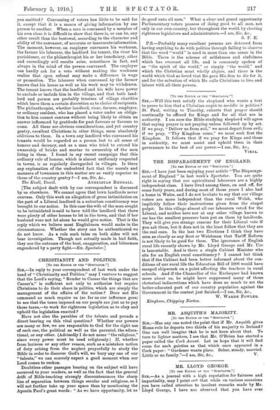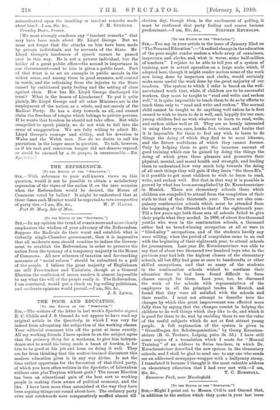MR. LLOYD GEORGE.
[TO THE EDITOR OF THE " SPECTAT0R...]
Sin,—As a journal with a high reputation for fairness and impartiality, may I point out that while on various occasions you have called attention to insolent remarks made by Mr. Lloyd George, I have not observed that you have ever animadverted upon the insulting or insolent remarks made [We most strongly condemn any "insolent remarks" that may have been made about Mr. Lloyd George. But we must not forget that the attacks on him have been made by private individuals, not by servants of the State. Mr. Lloyd George's insolences of speech cannot be passed over in this way. He is not a private individual, but the holder of a great public office—the second in importance in our Government—and to him is given a public trust. Part of that trust is to set an example in public morals in the widest sense, and among them in good manners, self-control in words, and the refraining from the injuries to the State caused by embittered party feeling and the setting of class against class. How has Mr. Lloyd George discharged his trust ? What is the lesson of Limehouse ? To put it quite plainly, Mr. Lloyd George and all other Ministers are in the employment of the nation as a whole, and not merely of the Radical Party. He has a duty towards us all, and cannot claim the freedom of tongue which belongs to private persons. If he wants that freedom he should not take office. But while compelled to speak plainly, we do not wish to fall into the error of exaggeration. We are fully willing to admit Mr. Lloyd George's courage and ability, and his devotion to Wales and the Welsh race. Nor do we desire to call his patriotism in the larger sense in question. To talk, however, as if his rash and rancorous tongue did not deserve reproof, or could be excused by a tu quoque, is unreasonable.—En. Spectator.]











































 Previous page
Previous page